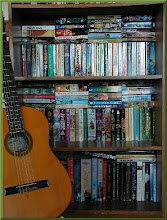This assignment was easy for me, as well. I knew what the primary conflict of the story was going to be from the beginning, and since the type of story I decided to write fit most closely with that original concept, I didn't have to change it. Choosing the conflicts was a bit harder, and defining them well enough to put them into a concise sentence was the real challenge. I finally have something I'm happy with, though, and I'm very pleased that I've done two assignments in two days, without feeling like I'm doing a half-arsed job on them.
The assignment is posted here: http://skadhisgydhja.livejournal.com/36328.html. I also included something Zette did herself in this chapter, but which wasn't part of the assignment. It was a basic, three part structure (beginning, middle and end.)
While thinking conflicts out, though, I also jotted down a preliminary timeline so that I could see what I thought would happen when. That's available here: http://skadhisgydhja.livejournal.com/36570.html
This assignment made me realise something else, though, and I'm not sure how I feel about it. I write primarily fantasy, which tends to have larger-than-life conflicts. The world is almost always at risk. And I really like that about fantasy. I enjoy reading it, and I enjoy writing it. But repeatedly in my own work, the threat to the world seems like it's always secondary, a MacGuffin. It looks important, but really what matters is the internal conflict of the main character. For example, in this story I'm still not sure who the antagonist is or what's going to be happening (other than in my character's head) at the climax of the book, but it doesn't seem to matter. All that stuff is, really, is a catalyst for the change of the main character, which is the real point. It's like I'm writing introspective fiction disguised as action stories.
Maybe that's just what "character-driven" means. I know I prefer to read stories where what happens to the character is the most important part. While I enjoy plot-driven stories sometimes, if the character's essentially the same, inside, at the end as the beginning I usually don't feel very satisfied. But I worry - does this mean that I don't have enough plot? Am I getting lazy and just not developing the action enough and it really should matter? Am I using this as an excuse for vagueness?
I don't know how to answer these questions. A good story, well edited, makes the events it contains look inevitable. Perhaps it's okay to be unsure at this point, and for the external action to follow the internal action in my mind. These are the kinds of questions and realisations that I was hoping this whole project would bring up, so I'll just be aware of it for now and see where the future exercises take me.
Subscribe to:
Post Comments (Atom)

1 comment:
Here's an interesting quote for you:
"If you wait for inspiration, you're not a writer, but a waiter." Anonymous
(I found it in a book today.)
Post a Comment